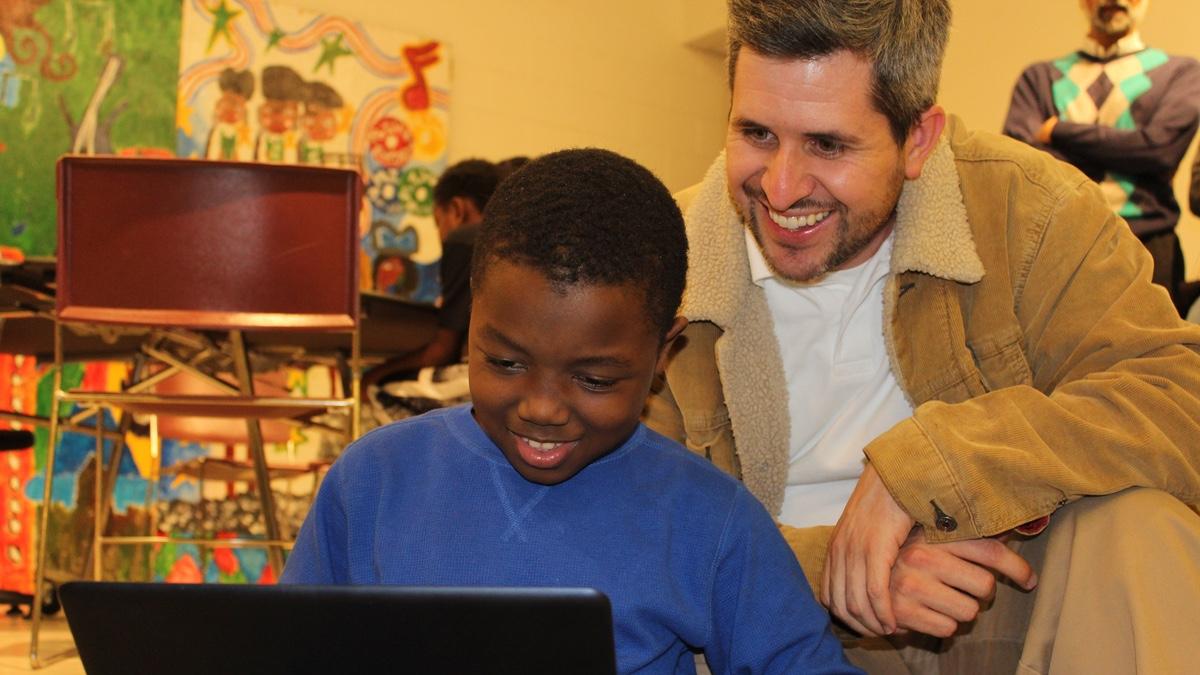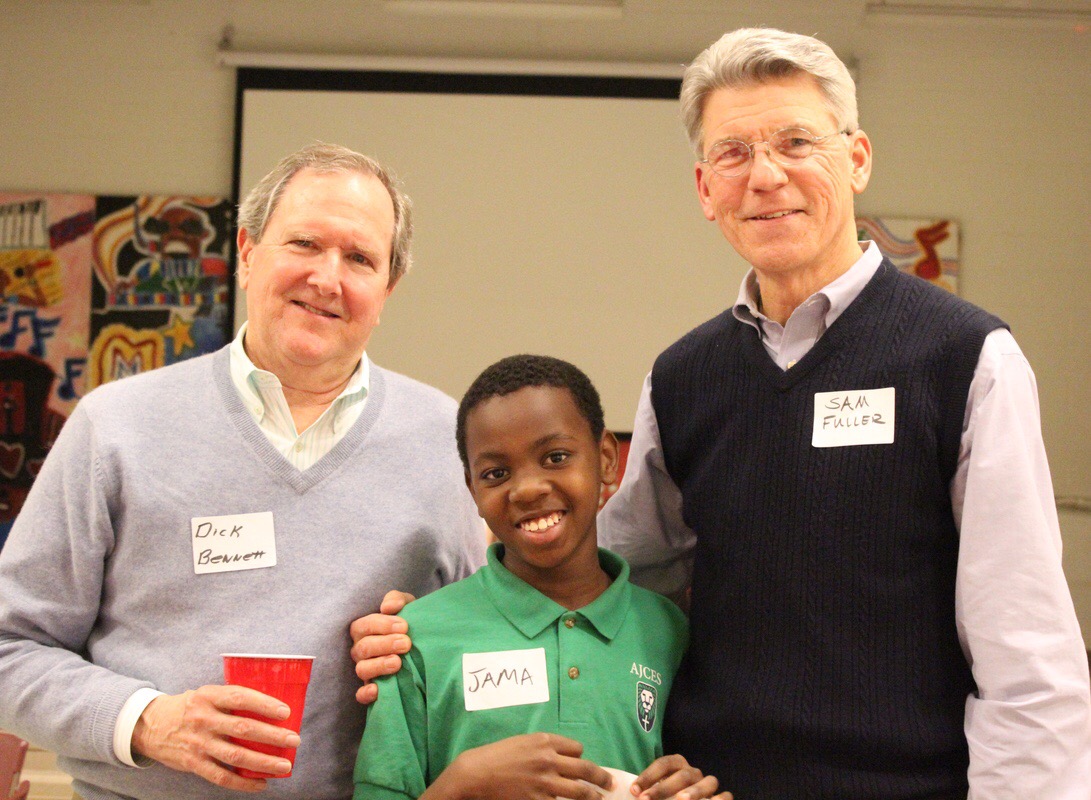Being a mentor at Peter Paul: Sometimes the mentee mentors the mentor, you know?
There are 200 kids at Peter Paul Development Center, only 30 have mentors. You do the math.

Peter Paul Development Center, one of the East End’s most robust after-school programs, celebrated a groundbreaking on Tuesday. They’re literally breaking new ground to add onto their current digs on 22nd Street–the area kids are heading over there in droves for after-school tutoring and general learning fun.
Right now, they’ve got about 200 kids in their program. That’s a lot to handle in just the small center they’ve been growing out of since 2007 (for the two decades beforehand, Peter Paul was housed within St. Peter’s Church across the street). And while the kids are generally positive about their experience, it’s widely accepted that their absolute favorite part of being involved with Peter Paul is their mentors.
Wait, I should clarify. Only 30 kids get to say that. The other 170 just have to watch as their peers get one hour a week with an adult friend who listens, offers advice, and just hangs out. It doesn’t seem like a big deal, but mentorships can expose kids to futures they didn’t even know were possible. Jessica Grove, who’s running the program as part of a one-year AmeriCorps VISTA placement, and Devan Colley, Peter Paul’s Development and Communications Coordinator tell me an anecdote about one little girl who met through her mentor an engineer. And now, guess what, the little girl is way, way into that idea.
Then the little girl herself walks into the room, says some hilarious things with the kind of confidence some people would pay real money to have, and walks out.
“It’s just amazing to see the confidence it builds in a child,” says Devan. “Whether it’s to be confident about their future or to raise their hand in the classroom. [Having a mentor] exposes them to different experiences, different lifestyle choices.”
Devan is a mentor herself, although hers is set up through Big Brothers Big Sisters, which has more policies in place for taking kids off-site, that kind of thing. If you mentor at Peter Paul and you want to deepen your relationship with your mentee, they’ll turn you over to BBBS, with whom they partner.
At PPDC, though, your commitment is just one hour a week, on site. While their program is focused on academics, you’re not beholden to homework help (although you certainly can if you want). Your mentee, who will be somewhere between 2nd and 12th grade–most likely closer to the former–can talk to you about whatever they want.
It’s something special to have an adult friend who isn’t a parent, a teacher, or some sort of other leadership figure. Although of course, you’re still in charge of the situation and no one’s asking you to let an eight-year-old act with total impunity, you play no role in their life other than to support.
Think about that for a minute. When you were growing up, who played that role for you? Who was 100% an advocate for you and your future besides your parents, who also had to provide for you and make sure you grew up to be a good person, which is a more complex relationship. I mean, dang, who’s playing that role in your life now? If you’re lucky, you’ve got one or two, but if you’re a kid without a lot of advantages, chances are slim.
“The way that mentoring works is that the more support systems a kid has in their life,” says Jessica. “The more likely they are to not drop out of school, skip class, or use illegal drugs. They’re more likely to succeed or go to college if they have at least one adult who can be that resource for them. A lot of our kids are from single parent homes, and mom’s working or dad’s working, and they don’t have that connection they sometimes need from an adult.”
She continues, “A lot of kids are used to authority figures in their life. Very frequently that’s kind of what we [meaning adults] do with kids: ‘Do it this way’ or ‘Do it that way’ or ‘You do this, you over here do this.’ In a lot of ways the mentor is just there as an outlet, a friendship, and someone who will help the kids make decisions for themselves.”

From left to right, Dick, Jama, and Dick’s co-mentor Sam.
Of course, mentoring impacts the mentee just as much, although it’s not quite as talked about.
Dick Bennett, a recently retired trial lawyer, agreed five years ago to co-mentor Jama for one school year. Jama’s parents were Somali refugees who had their son in Kenya. The mother, who speaks limited English, brought Jama to Richmond. Dick ended up devoting two years–one hour a week–to reading, helping with homework, and going on field trips. But it wasn’t always easy.
“We almost gave it up after fourth grade because he was so quiet, and I didn’t feel much of a connection,” he says.
But Dick and his co-mentor stayed the course, and in fifth grade, Jama began to open up. He began to play basketball on a team (Dick attended games, of course) and began to do well in school. Jama was picked by his class to read Dr. Martin Luther King, Jr’s “I Have a Dream” speech at St. Paul’s church annual Micah service near the Capitol.
“He did it beautifully,” says Dick. “To a standing ovation. He grew six inches that day.”
Dick and his co-mentor helped Jama apply to Anna Julia Cooper School, where he is now in sixth grade and doing well.
“I think this young man is a survivor and is very determined to succeed,” says Dick, who is delighted that he hung in for the long haul.
— ∮∮∮ —
If you’re interested in beginning a lifelong relationship with a mentee, and you’ve got one hour a week to spare (plus a little bit of training), contact Jessica Grove at jgrove@peterpauldevcenter.org.
There’s also lots of facts and figures at mentor.org.
-
Recommend this
on Facebook -

Report an error
-

Subscribe to our
Weekly Digest





There are no reader comments. Add yours.